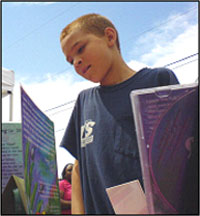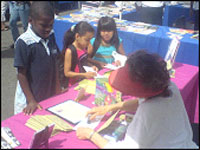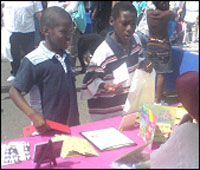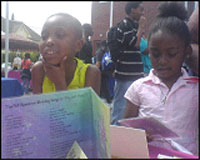On August 11, 2007, ELA participated in the Sixth Annual Educational Resource Street Fair, sponsored by Casey Family Programs, Qwest and Peoples Institutional Baptist Church. Casey Family Programs invited ELA to participate by offering us a complimentary table.
Thanks to generous sponsorship, we offered forty-five Full Spectrum Birthday Song CDs, as gifts, to children, families and for raffle ticket prizes. A couple adults who visited the ELA table were very excited to receive this learning tool for use at their day care centers. ELA’s participation with fair attendees bridged forty-five song CDs into the ears of hundreds. We also gave away approximately one hundred “Five Ways To Think Favorably About Feelings” brochures.
One of the greatest benefits of being a part of the fair was having the opportunity to engage with hundreds of children who came to our table, with varying degrees of curiosity. Each child who comes to the fair must first register at the welcome table. They are then given a passport and are told that once they receive “stamps,” from the information tables, they can cash the passport in for free school supplies.
Children at the fair are generally in a hurry to collect those passport stamps but we devised a method by which children could receive something in addition to stamps and ELA brochures. We were glad to see several children approach our table and engage in a learning process by first letting them know that our table gave out stamps and food for thought. We pointed to our table sign:
Name a feeling, describe it and get a stamp!
Some children scratched their heads and pondered. Had they been asked this question before? Had a stranger behind a table ever asked them such a question at a fair? One adult looked at our sign and said: “Hmmmm…that’s different!” These kinds of responses let us know that we were tossing something unique into the mix.

Many of the responses proclaimed “Happy!” The irony here is that we are offering a musical learning tool, entitled: The Full Spectrum Birthday Song (or Why Just Happy?). We like “happy” as much as the next guy and we want to inspire the warm embrace of all feelings.
Easier said than done—and even less easy to talk about.
One boy said “mad” and that he would handle it by discussing it with friends. His young companion chimed in to name the same feeling and same method for handling it: His friend retorted: “No you don’t (discuss your anger with friends)—when you’re angry, you wanna burn up the whole world!”
Another boy read the sign and adamantly backed away from the table proclaiming: “No, no I can’t do that. I won’t do that. I can’t do that.”
When we gently inquired as to why he couldn’t name a feeling and describe it, he blurted out: “Because I don’t trust people.” We commended the boy for so clearly expressing the reason for his trepidation, that, unfortunately, some people don’t inspire or earn our trust, and offered him a brochure and birthday song CD, both of which he took.

One child said: “angry” and when asked to describe what he does when he’s angry, he simply said: “I go to sleep.” Several children said that when they’re angry, they go to their rooms. They said they got angry for being blamed for something they didn’t do or for having something taken from them.
Several children said: “sad.” We commended those who said they cry when they’re sad, for so congruently expressing an emotion tied directly to a feeling. We also commended those who said that when they are happy, they play…another point of congruency.
An eight-year old boy said that when he’s sad or mad, he notices memories coming up. We appreciated his ability to track a thinking process as opposed to simply reacting to a feeling and for that, we offered encouragement and a CD.

One of the important distinctions we make in our teachings is the difference between a circumstance and a feeling. Given that feelings arise, in part, out of a perception of a circumstance, not the circumstance itself, it is important to clarify one’s perception of circumstances, while also exercising the ability to comprehend and express relevant feelings.
Another essential distinction en route to knowing and accepting feelings is to understand the nature of a feeling and how it is connected to a “soft” need like the need for acceptance, understanding and nurturance. Feelings often alert us to a soft need and can, if translated accurately, assist us with gathering up the impetus to fulfill the need.
After noticing our sign, one of the adults who visited our table exclaimed: “With these three (children) I either become emotionally intelligent or lose my mind.”

Another adult offered to name “frustration.” Her reason being: “coming home to a house, after a long day of work, to find that nothing has changed.” She went on to explain that she doesn’t choose to blame her children for her frustration, that they are innocent and that it is up to her to deal with her own frustration in a direct and responsible way.
ELA’s participation at the Sixth Annual Educational Resource Street Fair was a grand success! Casey Family Programs has invited ELA back for next year, and perhaps to undertake a more active partnership role.